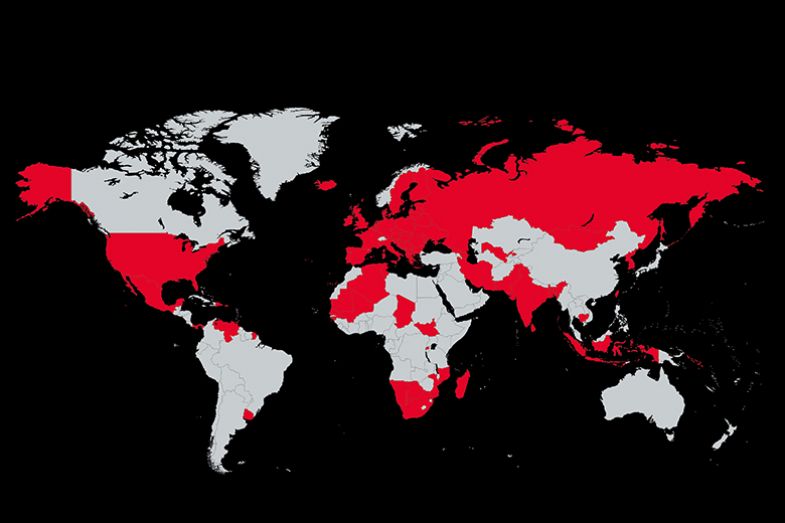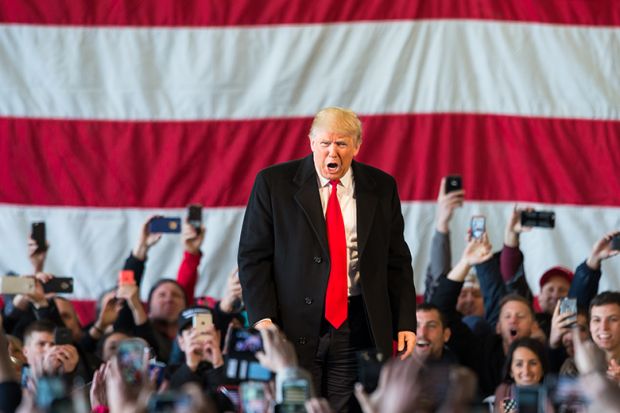It has been described as “the year of elections”. During 2024, countries that are home to around half of the world’s population will go to the polls, including eight of the 10 most populous nations. In total, around four billion people will have the opportunity to take part in regional, general and presidential elections.
But what role will higher education play in contenders’ campaigns and voters’ decisions? And how will education and research be reshaped by the results? Here, Times Higher Education journalists take the political temperature in key sectors around the globe.
UK
If the polls giving Labour big leads are to be believed, the UK’s general election will eject from power a Conservative Party often hostile to universities on cultural and economic grounds after its shift towards non-graduate voters in the wake of the Brexit vote.
The Westminster government controls education policy in England, where the tuition fee cap has been frozen at £9,250 since 2017, leading to real-terms falls in the unit of resource for teaching home students. The Conservative government has offered no prospect of change despite increasingly loud warnings of a brewing crisis in English university funding.
But beyond saying that Labour has dropped its Corbyn-era policy to scrap fees and criticising the funding status quo as failed, party leader Sir Keir Starmer has offered no detail on what would change under a Labour government.
In UK-wide immigration policy, the Tories’ drive to reduce net migration brings rhetoric and policy changes around student visas that alarm universities, as falls in vital international recruitment for some deepen the sense of a funding crisis. Though Labour might brighten the tone, sector leaders are concerned by its silence on the graduate visa route, put under review by the Tory government.
While Labour would cease the “culture wars” approach to universities, a bleak outlook for the public finances is likely to be the key factor affecting policy, whichever party takes power.
John Morgan
US
Even at a moment when higher education has become a relatively noisy policy topic in the US – driven by worries and posturing over student costs, job market disruptions, social divisions, freedom of speech and more – the combination of concerns is still not likely to make the sector anything near a decisive factor in almost any 2024 voting.
Yet the election outcomes in November could nevertheless have major implications for US universities, starting with the tough-to-predict presidential race between incumbent Joe Biden and his Republican opponent – most likely, at the moment, Donald Trump. The election could also give one of the parties full control of the now-divided Congress and shift power among states, which have become increasingly assertive and unified on policy strategies as federal lawmakers sit locked in perpetual partisan stalemate.
Mr Biden and his fellow Democrats have placed a major priority on boosting student aid and forgiving existing student loan debt, as well as improving racial and gender equity in admissions and hiring. Mr Trump and other Republicans have pushed restrictions on immigration and international partnerships, and antagonised universities with tactics that include threatening their tax-exempt benefits and appointing partisans to their governing boards. Both parties have historically shown support for academic research, though increasingly Republicans are reconsidering even that.
Paul Basken
Countries that will hold elections in 2024 (in red)

India
For Narendra Modi, another victory for his Hindu nationalist Bharatiya Janata Party (BJP) in a general election expected this spring would mean the continuation of his National Education Policy (NEP), first introduced in 2020.
The government’s flagship policy has lofty, long-term ambitions to overhaul the world’s third-largest higher education sector by creating a new set of administrative bodies for funding and regulation and redrafting the frameworks for accreditation and qualifications.
And while the BJP’s third electoral victory looks very likely, its opponents appear likely to take aim at the NEP. The Indian National Congress has already moved to scrap key reforms in the state of Karnataka, where it holds power, and has made this a plank of its manifesto for 2024.
The scheme’s unpopularity with students has also led to a coalition of 16 student groups to join together to call for a rejection of the BJP.
It is less clear what an underdog win for Congress, or for the Indian National Developmental Inclusive Alliance (INDIA) coalition, would mean for the sector – but scholars hope it would involve more academic freedom. Universities have complained of an atmosphere of fear under Mr Modi, particularly after one paper from Ashoka University accused the BJP of meddling in the 2019 election results.
Patrick Jack
European Union
When the European Union’s 400 million voters head to the polls in June, they will be voting amid the resurgence of the far right across the continent.
Forecasters are currently anticipating gains in the European Parliament for the Identity and Democracy group – comprising nationalist, Eurosceptic parties including France’s National Rally, Germany’s Alternative für Deutschland and Italy’s Lega – with Stéphane Séjourné, former head of the centrist Renew Europe party, warning that the EU could become “ungovernable” should they succeed.
As the European University Association noted in its future-gazing What if? report in January, EU politics are becoming “increasingly important for universities” – indeed, some MEPs are advocating for Brussels to have greater powers over higher education – with a “functioning and open multilateral and multilevel governance system” fundamental to international cooperation. The European Parliament elections, the EUA says, “will be a test case to see [to] what extent [far-right] forces will gain further influence or not over EU policies”.
Emily Dixon
Mexico
The only thing certain in the Mexican election on 2 June is that it will end the reign of strong-man president Andrés Manuel López-Obrador.
But, although the country’s system does not permit him to run again, the influence of Mr López-Obrador will still dominate proceedings whether or not the candidate of his Morena party, Claudia Sheinbaum, wins. The left-winger’s six-year presidency has seen academics accused of corruption, institutional budgets slashed and a new science law passed that many saw as an attempt to seize control of the country’s research priorities.
Dr Sheinbaum is, like Mr López-Obrador, a former mayor of Mexico City, but has also been a professor at the National Autonomous University of Mexico, which has led some to hope she will be more sympathetic to the academy’s cause.
Her main challenger, Xóchitl Gálvez, has also signalled a different approach, proclaiming that “a country without scientific research is a country without a future”. How easy it will be to secure a future for research institutions currently on their knees remains an open question.
Tom Williams
Indonesia
The main question when the world’s biggest Muslim majority country holds elections is whether the frontrunner, defence minister and former general Prabowo Subianto, will win an absolute majority in February or face a run-off poll in June.
Higher education is not expected to figure prominently, but the issues at stake might energise Indonesia’s sometimes rowdy students. Mr Prabowo, son-in-law of former president Suharto and founder of right-wing nationalist party Gerindra, has long been accused of serious human rights abuses across the archipelago.
His running mate is Gibran Rakabuming, the 36-year-old son of outgoing president Joko Widodo, whose professed determination to end Indonesia’s culture of ruling dynasties has come under question, particularly after the country’s constitutional court tweaked the age limit rules to allow Mr Gibran to run.
In August, the court also overturned a ban on campaign events at educational institutions. If the election ignores campuses, campuses will not be ignoring the election.
John Ross
South Africa
South African democracy is approaching its 30th birthday like most people do – with some trepidation. A struggling economy, record power interruptions, allegations of corruption and widespread dissatisfaction with the African National Congress (ANC), which has ruled since 1994, mean President Cyril Ramaphosa faces a tougher re-election challenge than any of his predecessors.
The Democratic Alliance (DA), the second-largest party in the Senate, has identified higher education as a key battleground, warning that students are the latest target of the ANC’s “tentacles of corruption”. The DA has called for Blade Nzimande, the higher education minister, to step down amid a corruption scandal of his own, believing that Mr Ramaphosa’s inaction is evidence of his cowardice.
Meanwhile, the communist Economic Freedom Fighters have become enormously popular among a furious student body that has grown tired of broken ANC promises regarding free tuition. Even Jacob Zuma, the former president who kicked off the government’s doomed attempt to abolish fees for poorer students, has said he will vote against the ANC.
Patrick Jack
Pakistan
Pakistan goes to the polls on 8 February, but its most popular politician, Imran Khan, is conspicuously absent. The cricket captain turned prime minister was jailed in August and faces multiple charges that have seen him barred from standing.
Another ex-premier, who was previously imprisoned and then exiled, is tipped to win power. Nawaz Sharif and his Pakistan Muslim League – which many believe was the victim of an unfair election in 2018 – will face Bilawal Bhutto Zardari’s Pakistan People’s Party in a poll that some claim has been rigged against candidates from Mr Khan’s Pakistan Tehreek-e-Insaf party, which won convincingly six years ago.
The poll will be an early test of reforms enacted in 2022 that lifted a four-decade ban on student unions at Pakistan’s universities. Unions were outlawed in 1984 amid concerns that they had stoked campus violence and were de facto youth wings of political parties. Universities will be keen to ensure the newly enfranchised organisations are not dragged into what is likely to be a fractious contest.
Jack Grove
Taiwan
Taiwan’s election of William Lai as president in January represents a third historic consecutive victory for the ruling Democratic Progressive Party.
“We managed to keep Taiwan on the map of the world,” Mr Lai told supporters at a rally after his win, which he labelled a “victory for the community of democracies” willing to stand up to China – which regards the island as part of its territory.
Mr Lai’s win over more China-friendly parties is unlikely to help universities repair the loss of students from the Chinese mainland, whose numbers dropped by nearly half, from 42,000 in 2016 to 25,000 in 2019, due to restrictive Beijing policies.
Instead the focus on attracting more incoming students will move to Vietnam, the Philippines and other Asian countries, with Taiwan aiming to have an ambitious 320,000 overseas learners by 2030 – a figure regarded as unlikely by experts.
Jack Grove
Register to continue
Why register?
- Registration is free and only takes a moment
- Once registered, you can read 3 articles a month
- Sign up for our newsletter
Subscribe
Or subscribe for unlimited access to:
- Unlimited access to news, views, insights & reviews
- Digital editions
- Digital access to THE’s university and college rankings analysis
Already registered or a current subscriber? Login








